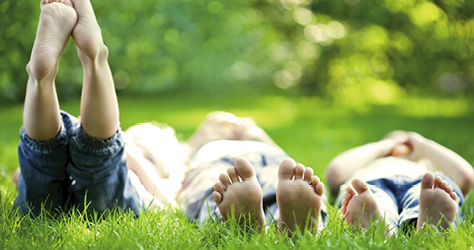Your child is changing constantly, here's what developments to expect in the coming six months
Every child is unique and although we can encourage them, they will do things at their own pace and in their own time.
At a glance
- Best friends forever
- Learning and taking risks
- Boosting self-confidence
- Developing a sense of humour

Best friends
In less than a year your little one has gone from 'Billy No Mates' playing alongside, but basically ignoring, other children to making proper friends. They should now find it easier to wait their turn (some of the time), express themselves clearly and they’re also beginning to develop a sense of what others are feeling – which all help in developing friendships. Girls tend to play in small groups of two to four and may pair off with ‘best friends’ at nursery/school, although if yours doesn’t it’s nothing to worry about – today’s best friend is not likely to be tomorrow’s. At this age, boys are more likely to play in bigger groups of six or seven.
Taking risks
Your little one’s physical play is probably getting hair-raisingly adventurous – climbing higher, jumping from impossible heights and dangling upside down from railings. It’s tempting to jump in and stop them - we all want our children to be safe. But experts say we should let them take age appropriate risks. That way they’re learning how to assess risk for themselves while the risks are small and not too dangerous, and they’re learning new skills like balance and co-ordination which will actually help them not fall out of trees later on.
They’re (not) joking
Pre-schoolers love jokes – except that their brains haven’t developed sufficiently to understand the word-play that’s the basis of most jokes. At this age their humour will be based on slapstick and visual funnies (wearing pants on your head etc.), followed a bit later by toilet humour. They love making up their own jokes – just don’t expect them to be funny just yet. The part of the brain that decodes jokes isn’t developed enough for that until aged six or seven.
I can do it, Mum
Your well-intentioned offers of help with buttons, zips, shoes, toothbrushes will probably be met with a cry of ‘I can do it myself!’ even if they are plainly struggling. While it may be easier/less stressful/quicker to do it yourself, try to resist the temptation to step in and take over: taking responsibility for their own dressing gives them confidence, boosts self-esteem and helps with those important fine motor skills.
Sleep
At this age they need 11 to 13 hours sleep a night, and aren’t likely to be sleeping in the day any more. Some pre-schoolers go to bed quite late if both parents are working as it makes sense to have family time together in the evening. But once they start school you might need to bring their bedtime forward a bit so they can fit in enough sleep. They’ll be exhausted anyway, especially in the first term.
How you can help
- If they’ve got too many toys, they can find it difficult to focus on anything for very long because there’s so much choice. Try hiding some and bring them out on rotation, which may help their attention span.
- Tap into their love of the natural world with some gardening: their own patch for veg/fruit/sunflowers if you have space; a window box of cress/tomatoes/pansies if you don’t.
- They love inventing words now: have fun creating crazy rhyming poems together, which will really help their language skills.
- Their concept of time is still quite vague (‘five more minutes’ won’t mean much), but they may master days of the week and months of the year. Yesterday and tomorrow will follow soon.
- Discover the joy of a free day out at a large garden centre (with tropical fish) or pet store. Why pay for zoos and aquariums when you can watch rabbits, hamsters, geckos and fish for free?
Read more about pre-school development anxiety and see our milestones guide.